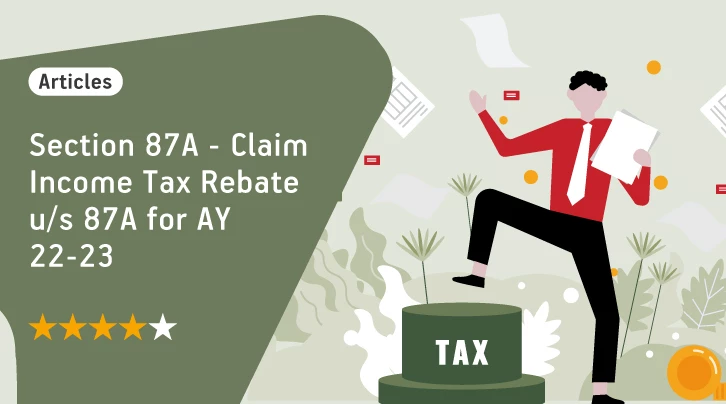What is Tax Rebate Under Section 87A?
Under Section 87A of the Income Tax Act, 1961, resident individuals with a taxable income of up to ₹5 lakhs can claim a tax rebate of ₹12,500 or the payable tax amount, whichever is lower, before adding cess. This rebate of ₹12,500 on taxable income of up to ₹5 lakhs is available for taxpayers using the older and newer tax regime till FY 2022-23.
To make the new tax regime more attractive, Budget 2023 has increased the rebate limit to ₹25,000 or the payable tax amount, whichever is lower before adding cess, on taxable income of up to ₹7 lakhs from FY 2023-24. For taxpayers opting for old regime, rebate of ₹12,500 continues.
Who is Eligible to Claim a Tax Rebate Under Section 87A?
Here are the eligibility criteria to claim tax rebate U/S 87A
The rebate is only available to resident individuals and not other types of taxpayers like HUFs (Hindu Undivided Families), companies, or firms.
The net taxable income for the financial year after claiming deductions under Section 80C, 80D, etc., but before adding cess is under ₹5 lakhs (old regime) or ₹7 lakhs (new regime).
The maximum 87A rebate is up to ₹12,500 (old and new regime) till FY 2022-23 and ₹25,000 for the new regime from FY 2023-24. The rebate is not applicable if the tax liability exceeds ₹12,500 and ₹25,000 under the old and new regimes, respectively.
Senior citizens between 60 to 80 years are eligible for the 87A rebate, but super senior citizens of 80 years and above are not eligible for this rebate.
How to Calculate 87A Rebate?
So, how is the Section 87A rebate calculated? Let’s understand this with the help of an example-
Mr. Navin, 30, a resident Indian, generated a gross annual income of ₹6 lakhs in FY 2022-23. Using the old tax regime, he claims a deduction of ₹1.5 lakhs under Section 80C for his investments. So, his net taxable income for FY 2022-23 is ₹4.5 lakhs.
His taxable income for the financial year is under ₹5 lakhs, so he is eligible for rebate u/s 87A of Income Tax Act, 1961 up to ₹ 12,500. Here’s how his taxes will be calculated-
Particulars |
Amount |
Gross Annual Income |
₹6 lakhs |
Deduction Under Section 80C |
₹1.5 lakhs |
Net Taxable Income |
₹4.5 lakhs |
Income Tax Payable (5% on income ranging between ₹2.5 lakhs to ₹5 lakhs) |
₹10,000 (5% of ₹2 lakhs) |
Rebate Under Section 87A |
₹ 10,000 (Rebate limit is up to ₹12,500) |
Total Tax Payable |
NIL |
4% Education and Health Cess |
- |
How to Claim Tax Rebate Under Section 87A?
Follow these steps to claim a rebate under Section 87A of the Income Tax Act-
-
Add your income from all the sources to calculate your total gross income for the financial year.
-
Deduct all the deductions and exemptions you're eligible for based on whether you've selected the old or the new tax regime.
-
For old and new tax regime till FY 2022-23, if the gross taxable income after claiming deductions is below ₹5 lakhs, you're eligible for a tax rebate of ₹ 12,500 under Section 87A.
-
For the new tax regime from FY 2023-24, if the gross taxable income after claiming deductions is below ₹7 lakhs, you can claim a tax rebate of up to Rs. 25,000 under Section 87A.
-
If you're eligible for the tax rebate, it'll be automatically applied at the time of filing tax returns,
Reducing Your Income Tax Liability with Section 87A Rebate
If you belong to the low-income group, section 87A is one of the most effective ways to reduce your tax liabilities. Understand the eligibility requirements of section 87A to take maximum advantage of this tax provision and avoid any discrepancies.
You can also consult a tax advisor to claim rebate under section 87A of the Income Tax Act, 1961.
Mutual Fund investments are subject to market risks, read all scheme related documents carefully.






 1800-270-7000
1800-270-7000




